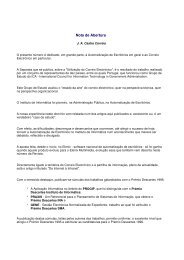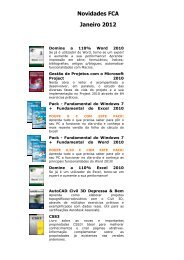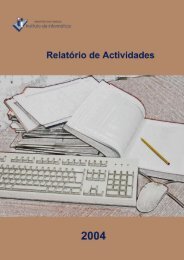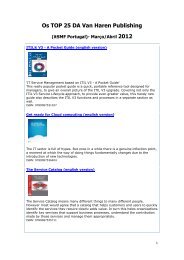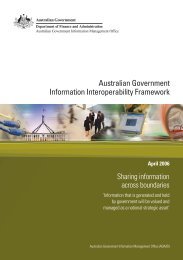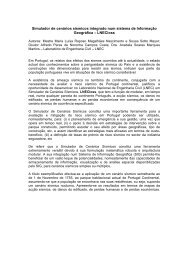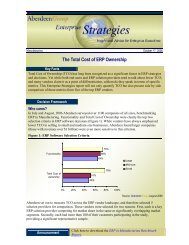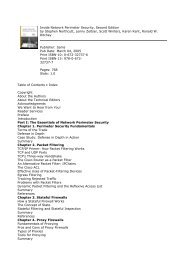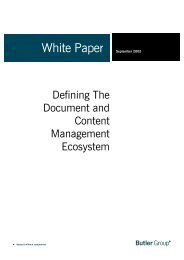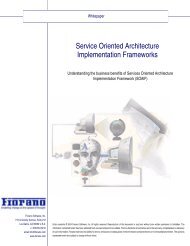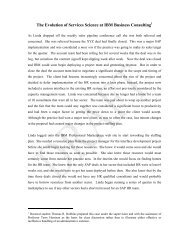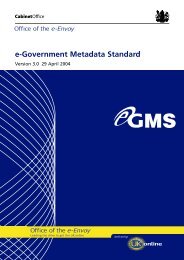OECD Peer Review of E-Government in Denmark - ePractice.eu
OECD Peer Review of E-Government in Denmark - ePractice.eu
OECD Peer Review of E-Government in Denmark - ePractice.eu
Create successful ePaper yourself
Turn your PDF publications into a flip-book with our unique Google optimized e-Paper software.
Two very important steps that government can take to encourage this type <strong>of</strong> e-government<br />
service <strong>in</strong>tegration and sophistication are to:<br />
• Provide common frameworks for service <strong>in</strong>tegration (e.g. enterprise architectures and<br />
<strong>in</strong>teroperability frameworks, etc.).<br />
• Implement Internet portals as the “s<strong>in</strong>gle-w<strong>in</strong>dow” onl<strong>in</strong>e service delivery environment that<br />
can provide: 1) the necessary focus and <strong>in</strong>centives; and 2) the common ICT platform for<br />
creation and delivery <strong>of</strong> more user-focused e-government services.<br />
<strong>Denmark</strong> has been mak<strong>in</strong>g solid efforts <strong>in</strong> both <strong>of</strong> these areas, which have elim<strong>in</strong>ated or reduced<br />
barriers to this aspect <strong>of</strong> user-focused e-government. Common frameworks are discussed <strong>in</strong> Chapter 6,<br />
while portals are discussed later <strong>in</strong> this chapter.<br />
The <strong>OECD</strong> survey showed that, at all levels <strong>of</strong> perceived importance, the second biggest reported<br />
constra<strong>in</strong>t on demand for e-government is lack <strong>of</strong> awareness <strong>of</strong> the availability <strong>of</strong> onl<strong>in</strong>e services. This<br />
can be regarded as a positive result, as it is relatively easy to address this constra<strong>in</strong>t by effective<br />
market<strong>in</strong>g <strong>of</strong> e-government through <strong>in</strong>itiatives such as the market<strong>in</strong>g campaign currently be<strong>in</strong>g<br />
developed by the Digital Task Force.<br />
Lack <strong>of</strong> awareness is also, to some extent, self-correct<strong>in</strong>g <strong>in</strong> the longer run; as more users<br />
experience e-government services, they become more likely to make others aware <strong>of</strong> them (the caveat<br />
be<strong>in</strong>g that it is important that services are high quality and user-focused, so that people do not convey<br />
a negative impression <strong>of</strong> e-government).<br />
Tow other constra<strong>in</strong>ts on demand that were seen as be<strong>in</strong>g important to some degree by over half<br />
<strong>of</strong> the survey respondents were user <strong>in</strong>experience or lack <strong>of</strong> skills needed to use onl<strong>in</strong>e services,<br />
followed by a perceived lack <strong>of</strong> user-friendl<strong>in</strong>ess. Aga<strong>in</strong>, these results <strong>in</strong>dicate an awareness <strong>of</strong> the<br />
needs <strong>of</strong> e-government users that aligns with the overall impression <strong>of</strong> Danish government<br />
organisations be<strong>in</strong>g <strong>in</strong>herently user-focused. Constra<strong>in</strong>ts related to the issue <strong>of</strong> the digital divide were<br />
seen as the least important (see Chapter 3 for further discussion <strong>of</strong> this issue).<br />
Box 7.1 Address<strong>in</strong>g lack <strong>of</strong> user experience<br />
<strong>Denmark</strong> has developed a way <strong>of</strong> address<strong>in</strong>g the lack <strong>of</strong> user experience, which is also an <strong>in</strong>terest<strong>in</strong>g early step<br />
towards multi-channel service delivery. 1881 is a call centre developed <strong>in</strong> conjunction with the www.danmark.dk<br />
portal provid<strong>in</strong>g users with equivalent access to the Danish public sector via telephone.<br />
1881 is an alternative way <strong>of</strong> access<strong>in</strong>g e-government for people unaccustomed to us<strong>in</strong>g the Internet or without<br />
Internet access. In addition to directly answer<strong>in</strong>g specific questions about matters <strong>of</strong> public <strong>in</strong>terest, and referr<strong>in</strong>g<br />
users to government organisations, 1881 provides guidance <strong>in</strong> us<strong>in</strong>g www.danmark.dk and other public Web<br />
sites.<br />
Provision <strong>of</strong> user-focused services<br />
As already noted, the <strong>in</strong>herent user-focus <strong>of</strong> Danish government applies to e-government. At the<br />
all-<strong>of</strong>-government level, e-government is positioned as an important part <strong>of</strong> the user-focused public<br />
sector modernisation programme. The e-government strategy re<strong>in</strong>forces this by stress<strong>in</strong>g the role <strong>of</strong> e-<br />
government <strong>in</strong> provid<strong>in</strong>g high-quality services and plac<strong>in</strong>g citizens and bus<strong>in</strong>ess at the centre <strong>of</strong><br />
government. This commitment is made concrete through the various targets and measures established<br />
by the strategy.<br />
129



